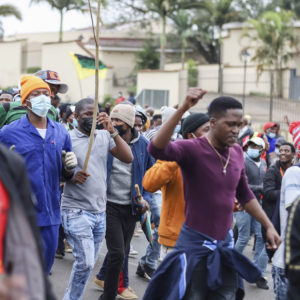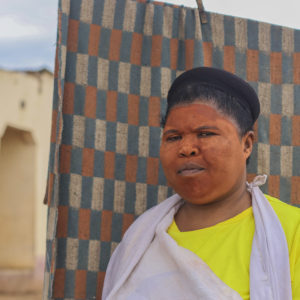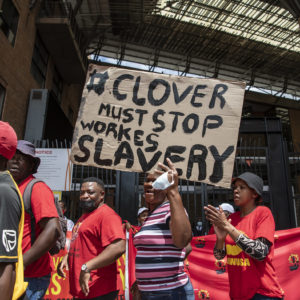eSwatini teachers’ union leader comes under fire
The police refuse to bite the bullet in their questionable persecution of the man fighting a wider battle for living wages for public servants. Instead, they aimed gunfire at his house.
Author:
25 April 2022

Amid a continuing dispute with public sector labour unions over a salary review, the eSwatini police have resumed the persecution of Mbongwa Dlamini, president of the Swaziland National Association of Teachers (Snat), the country’s largest union.
Earlier in April, Dlamini’s residence was sprayed with a hail of bullets by a highly militarised unit of the eSwatini police called the operation support service unit (Ossu), putting the lives of his children in danger.
One of the charges he faces is interfering with the police while they were carrying out an arrest. A hearing has been scheduled for 29 May at the magistrate’s court in Matsapa, a town on the outskirts of Manzini city.
Related article:
“This charge of obstructing the police from arresting a certain comrade was first pressed against me by the police at Sigodvweni station in 2020. I had never tried to obstruct them. Surprisingly, the officers who charged me for obstruction were general duty officers, while the comrade was being arrested by traffic police,” Dlamini said.
“I’ve been in and out of court since these charges were made. The police eventually withdrew these charges in early 2021 because they had no evidence. But now, even though the comrade who was arrested was himself released with no charges, they reinstated the case against me in March 2022.”
The attack on Dlamini’s house took place on 3 April when the Marula Festival was under way at the Hlane Royal Residence. It is a festival in which marula fruit is fermented to make beer. “Millions in Swazi lilangeni are spent by the king on this festival, which is essentially a drinking spree,” Dlamini explained.
A tense atmosphere
Dlamini’s house in Helemisi is close to the road where people on their way to the event would travel. The security forces were jittery. Even though the uprising that forced King Mswati III to briefly flee his kingdom mid-2021 was put down by the army, who killed at least 70 and injured hundreds, a strong anti-monarchist sentiment prevails across the country.
With the security forces persisting with violence to crack down on peaceful pro-democracy protests, properties and businesses owned by the billionaire king and his cronies have come under petrol bomb attacks. Houses of several pro-democracy leaders have also been bombed in retaliation, allegedly by the security forces.
While the festival was under way in this tense atmosphere, some members of the Swaziland Liberation Movement (Swalimo), who were on their way back after attending a party programme, gathered at a bus stop near Dlamini’s house.
Related article:
Ossu immediately opened fire on them. Running for their lives, they scaled the fence and jumped into Dlamini’s yard. The police pursuing them opened several rounds of fire aimed at the house. “Even though they had already crossed into neighbouring houses, the police continued to fire into my residence,” said Dlamini, who was not home at the time.
He was informed about the incident through a phone call from his children, aged 15 and 19, who had to escape from their house to a neighbouring homestead. “When I rushed back, I saw a huge police presence around my house. I had to keep away from the house for safety for a few days before I could return,” Dlamini said. “They had my house under continuous surveillance.”
Threatening unemployment
The Teaching Service Commision (TSC) is also going after Dlamini’s job and has reinstated an old and unsubstantiated charge of professional misconduct against him. It was originally made in January 2019, only months after he had become the president of Snat in October 2018, .
“Claiming that I did not write a date somewhere in the scheme book [where teachers pen down a timeline for covering the syllabus], they framed me for professional misconduct and suspended me from teaching for over two years. I never got a trial,” Dlamini said.
Related article:
During this period he was not allowed to teach. “I could not even access the premises of my workplace, not even to pick up my son, who studies in the same school. I was cut off from all access to his teachers. Even at the parents-teachers meeting I was not allowed to enter the school,” he said.
It was only in October 2021 that the TSC lifted his suspension and assigned him to another school, further away from Manzini, which is the centre of Snat’s head office. However, within three months, in January 2022, the TSC reinstated the case against him.
Dlamini has approached the industrial court to stop the TSC from proceeding with this charge. The court has scheduled a hearing for 9 June. Until then, the TSC shall not proceed with any action on the basis of this charge.
The larger dispute
This resumption of Dlamini’s persecution began with the build-up to the government’s dispute with a coalition called the Public Sector Associations (PSAs), which comprises four unions representing accountants, nurses, teachers, and public services and allied workers. Snat is the largest of them, representing about 14 000 of the estimated total of 16 000 teachers in the country.
According to a July 2016 collective agreement between the government and the PSAs, which was later reinforced by an order of the court, the salaries of the country’s estimated 44 000 public servants had to be reviewed in the financial year 2021-2022. However, the government has failed to hold the review so far and the financial year has come to a close.
Related article:
Backtracking on the commitment made in the agreement to review salaries, the Ministry of Public Service has instead offered a simple cost of living adjustment. The PSAs have rejected this, arguing in a joint statement on 8 April that what was offered would not amount to any significant hike.
The government’s refusal to review salaries against the backdrop of “recent increases in prices of basic commodities and goods such as fuel, electricity, water and bread means that many of our people shall be further condemned into the abyss of poverty and deprivation and we are not going to allow that to happen”, the PSAs stated.
Teachers on the front line
Further undermining the job security of teachers, the TSC announced on 13 April that all teaching posts in primary and secondary schools will be on a contract basis only and none of the teachers will be employed this year on a permanent and pensionable basis.
Even before this announcement, many teachers had been working for as long as 16 years on fixed-term contracts renewed every two years, Dlamini said. Now the government is seeking to make this a norm for all of them.
“Teachers on contract are not entitled to maternity leave, housing allowance, travelling allowance and many other benefits. So we will not accept this. We demand permanent employment,” he said, reiterating the permanent nature of the job.
Related article:
The government has cited poverty to justify the contracts and is backtracking on the promised salary review of public servants who are essential for running government services. Nevertheless, the king, who controls most of the economy and runs it for the profit of himself and his cronies, continues to spend billions of dollars every year on grand festivities, his birthday party, palaces, jewels, a fleet of Rolls-Royce cars, private jets and other indulgences.
It is for this reason that even the economic struggles of unions take the political form of an anti-monarchist, pro-democracy struggle in Eswatini, so renamed by Mswati. “Democracy Now!” and “Mswati must fall!”, originally the slogans of the Communist Party of Swaziland, of which Dlamini is a member, have thus become the common slogans of a cross-section of the people, including the public servants who are only seeking decent living wages.
This article was first published in Peoples Dispatch.





